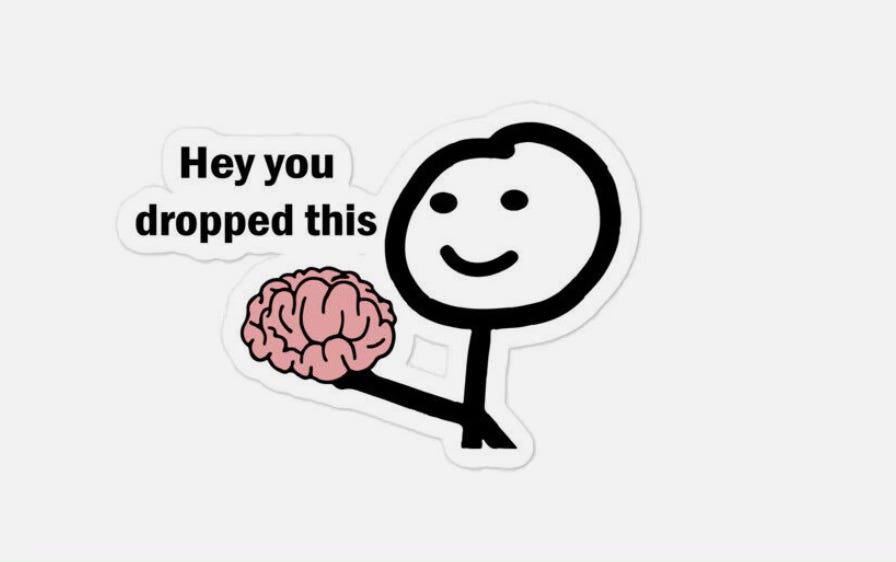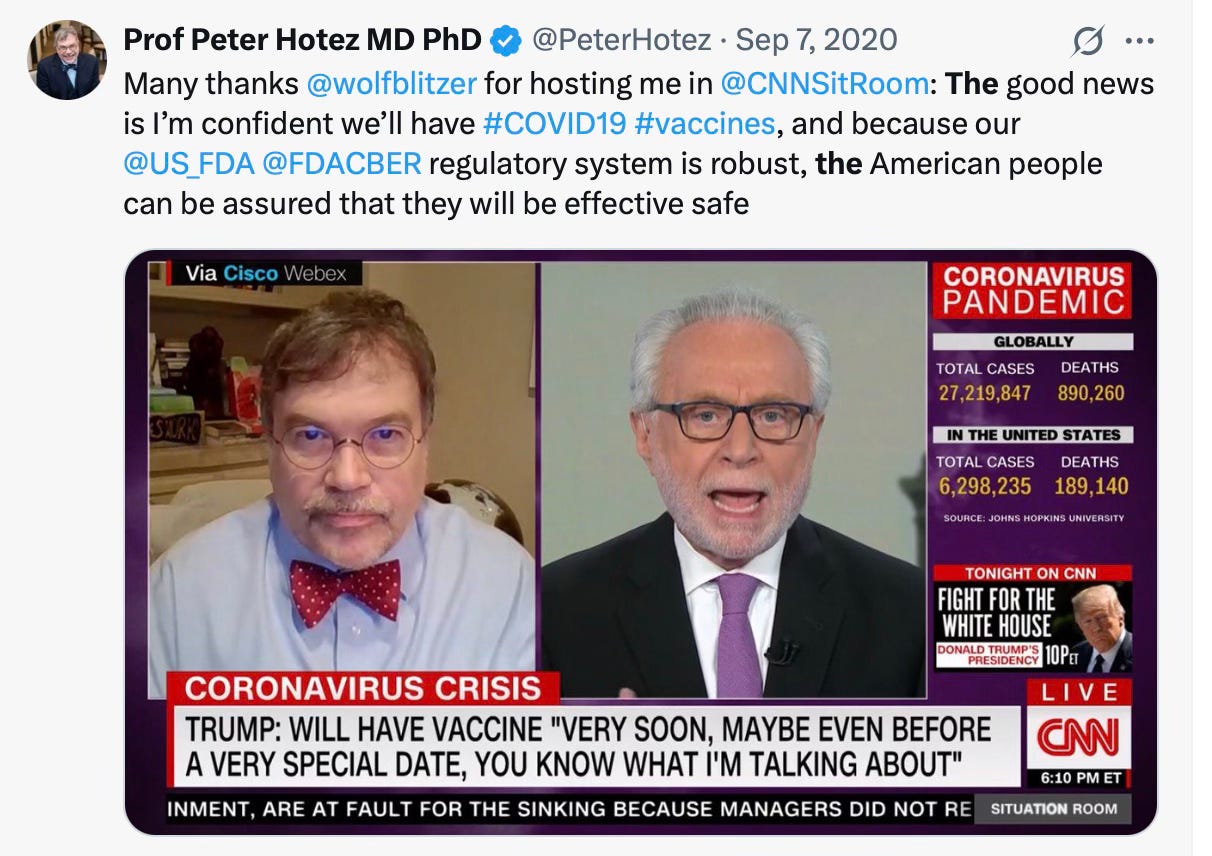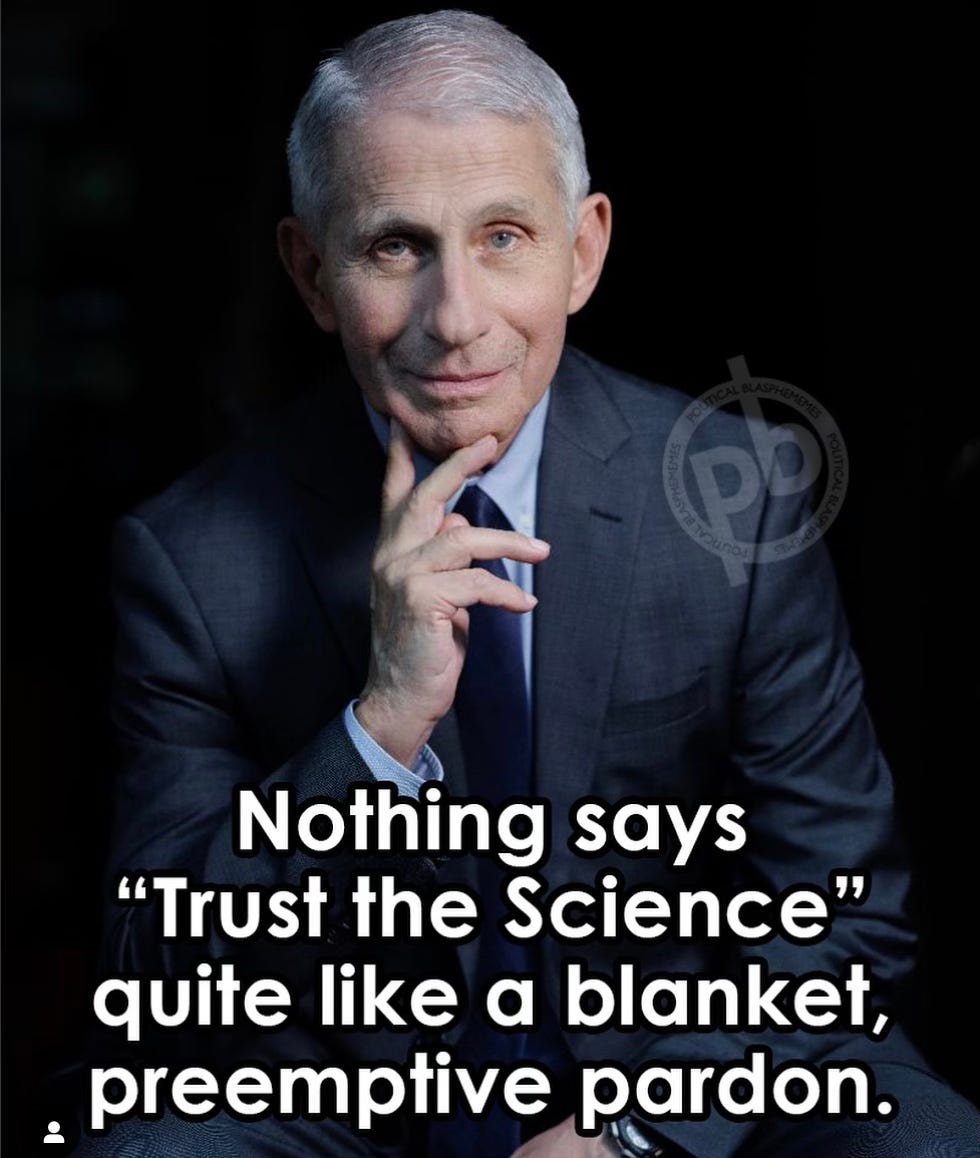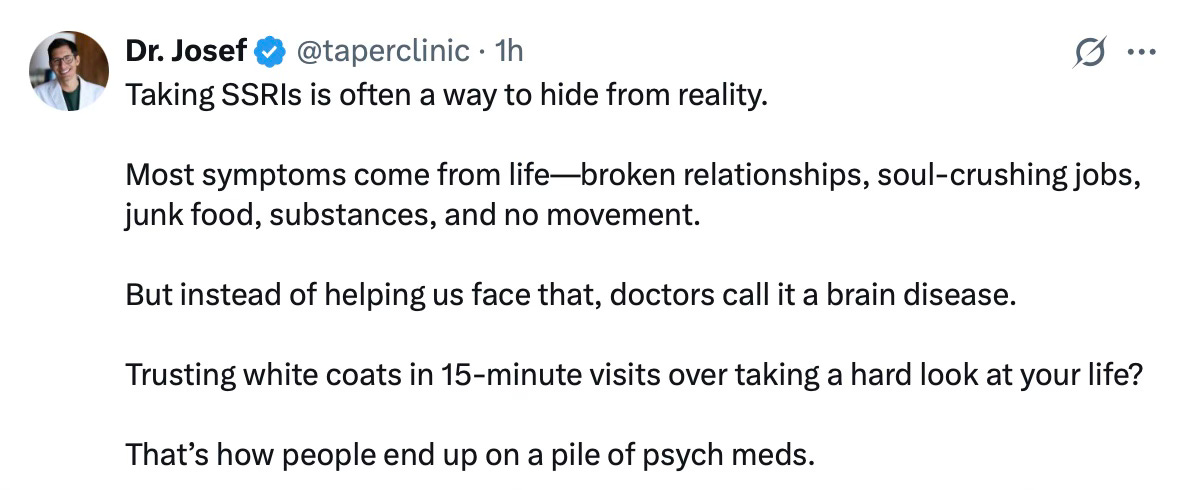The Matrix Is Real
People really ARE experiencing a different reality than you
I had an encounter last week that left me questioning what I thought I knew about our collective reality. While discussing the Make America Healthy movement with my web designer—a seemingly informed, intelligent professional—I casually mentioned Executive Order 14212, establishing the Make America Healthy Again Commission investigation into psychiatric medications. He stared at me blankly.
"Make America what now?"
I laughed, assuming he was joking. He wasn't.
This man—who stays connected to current events, runs a successful business, and interacts with numerous clients daily—had never heard of an executive order signed by the President over two months ago, establishing a commission specifically tasked with investigating psychiatric medications and childhood chronic disease.
And it's not just him. My conversations with local physicians—primary care doctors and psychiatrists alike—have been equally bewildering. These medical professionals, people I respect and who undoubtedly want the best for their patients, seem to inhabit an entirely different information universe.
They appear completely unaware of documented medication harms and dependency issues. They continue to taper patients off drugs too quickly, inducing withdrawal symptoms that they misinterpret as a "return of the mental illness." They believe FDA reviews guarantee safety and efficacy. They follow CDC guidelines without question and have never considered that the American Medical Association or American Academy of Pediatrics guidelines might represent industry-funded misrepresentations of scientific findings designed to fuel their respective industries.
WTF!? I have thought.
They are living in a completely different world. I feel like an alien speaking a foreign language. And of course, from their perspective, I come across as some conspiracy nut who's gone down a rabbit hole of misinformation. The cognitive dissonance is staggering. Every time I leave these conversations, I need to recalibrate and figure out how to exist in this bifurcated reality.
How is this possible? The answer, I realized with uncomfortable clarity, lies in the parallel information universes we now inhabit, curated by algorithms and attentional biases that have become the invisible architects of our perceived realities.
The Great Awakening... Or Is It?
For the past few years Post-Covid, my social feeds have been flooded with content criticizing psychiatric drugs. Articles questioning ADHD diagnoses, exposés on SSRI side effects, testimonials from people harmed by psych drugs. Even The New York Times recently acknowledged that scientists are questioning fundamental assumptions about ADHD, including whether it's truly a medical disorder requiring medication. To be honest… it’s been a bit validating.
Perhaps I'm part of a growing countercurrent—a network of critical voices gaining momentum against the pharmaceutical tide. Each daily social media post, weekly podcast, and carefully crafted Substack article gradually erodes the fortress of pharmaceutical messaging that has dominated our cultural understanding of mental health for decades.
Like water shaping stone, these persistent droplets of alternative perspective are beginning to wear channels through the monolithic narrative. The algorithmic walls may still separate our information worlds, but the boundaries are becoming more permeable. When patients now arrive quoting something they've read questioning the chemical imbalance theory or mentioning withdrawal effects their doctor dismissed, I recognize the small but significant victories of this collective effort. The conversation is shifting—slowly, unevenly, but perceptibly—and even those firmly entrenched in conventional narratives are encountering cracks in their information foundations.
My reality is filled with evidence of a mass awakening—a growing recognition that the psychiatric-pharmaceutical complex has pathologized normal human experiences. I've even written extensively about it myself.
Yet for my web designer—and apparently many others—this conversation simply isn't happening. Their algorithms serve different realities entirely.
What I've come to realize is that my information landscape is extremely curated. On social media, I deliberately follow researchers and experts across the globe who specialize in topics I care about: medical intervention efficacy and safety, mRNA vaccine research, critical psychiatry voices, health freedom advocates, and champions of informed consent. I've intentionally sought out information beyond mainstream U.S. news feeds after recognizing the propagandistic nature of conventional media outlets.
To me, it seems painfully obvious that major news networks and publications are compromised—serving corporate and political interests rather than objectively reporting facts. The COVID propaganda was so transparent that I assumed everyone could see through it. I thought it was common knowledge that television "experts" are paid spokespeople advancing specific agendas.
But family gatherings over holidays and meeting new clients have become powerful reminders that those who've "awakened" to these realities remain a minority. While I experience my information environment as a "great awakening," most people continue to be informed primarily by mainstream sources that reinforce entirely different narratives.
I find myself shocked watching relatives ingest processed foods while worrying about their frequent illnesses, faithfully following their doctors' advice about seasonal vaccines, cholesterol management, and genetic disease risks—advice I now view with profound skepticism. I wonder how they can blindly accept what they're being told while missing what seems so obvious to me.
Yet the truth is, I wasn't always here either. I once believed our government generally acted in our best interests. I trusted that doctors received accurate, up-to-date scientific information. I believed the United States represented the pinnacle of scientific and health achievement. I assumed news reporting was mostly accurate and that journalists served as independent watchdogs essential to democracy.
I now view that version of myself as a child—innocent, trusting, and fundamentally naive. Like looking at old photographs where my physical features are recognizable but the expressions and posture belong to someone else entirely. That previous self existed in a comforting fairy tale where institutions were fundamentally benevolent, experts were unbiased, and the systems designed to protect us actually did so. I remember the certainty of those beliefs—how solid and unquestionable they felt—and marvel at how completely that foundation has dissolved.
The transition from that state of innocence wasn't a single moment of awakening but a gradual, often painful process of disillusionment—each new piece of evidence chipping away at the edifice of trust I had built my worldview upon. Sometimes I feel a strange nostalgia for that simpler self, for the comfort of certainty and the security of trusted authorities. It must be similar to how adults sometimes yearn for the uncomplicated days of childhood, when parents seemed all-knowing and the world's complexities remained safely hidden behind a veil of simplification.
But I can't unsee what I've seen or unknow what I've learned, any more than an adult can genuinely return to the cognitive state of childhood. The mind, once expanded by new understanding, doesn't contract back to its original dimensions. And so I move forward with both the burden and the freedom that comes with this more complex reality—sometimes envying those who remain in their state of innocence, but never truly wishing to return there myself.
I remember how disorienting it was when this narrative crumbled—when the evidence no longer fit the story I'd believed. The realization that I'd been propagandized was jarring. And once seen, it couldn't be unseen. I began noticing it everywhere: in movies and television shows, news broadcasts, political debates, commercial advertisements—all shaping our collective consciousness and manifesting in everyday conversations.
The Layers of Algorithmic Reality
Understanding how profoundly our perception is shaped by algorithmic curation adds a new dimension to our discussions of mental health, medical care, and societal understanding. This isn't just about casual news consumption—it affects our most fundamental beliefs about health, illness, and appropriate treatment.
Consider how these distinct information universes function:
In the conventional medical universe, physicians are trained through medical schools heavily funded by pharmaceutical companies. They read journals that publish primarily pharma-sponsored research. They attend continuing education often sponsored by the same interests. Their professional organizations receive significant industry funding. The algorithm of their professional information environment systematically excludes certain viewpoints and amplifies others.
Meanwhile, in what might be called the "critical health" universe, researchers, clinicians, and patients who've experienced adverse effects share information through alternative channels. Studies showing negative outcomes or questioning standard practices circulate widely. Personal testimonials about medication harms receive serious attention rather than dismissal. The algorithm here elevates different voices and evidence.
Both groups believe they're following "the science," yet their understandings of what constitutes valid scientific evidence differ dramatically. Both believe they're acting in patients' best interests, yet their conceptions of harm and benefit barely overlap.
What makes this particularly insidious is that these parallel information streams don't just affect our opinions—they shape our very reality. If you've never been exposed to credible information about SSRI withdrawal syndromes, you won't recognize them when they appear in your patients. Instead, you'll interpret those symptoms according to the explanatory framework you do possess: a "return of the underlying condition."
We don't know what we don't know—a simple truth that should humble us all. Each generation looks back at previous ones, astonished at their blind spots that seem so obvious in retrospect. What am I missing right now? What evidence haven't I encountered? What if my current understanding, though more nuanced than my previous one, is still woefully incomplete?
This isn't cause for paralysis but for intellectual humility. It reminds me to hold convictions with open hands rather than clenched fists, to listen for signals of realities I haven't yet perceived, and to extend grace to others still navigating their own limited information landscapes. After all, wisdom isn't found in certainty but in recognizing the boundaries of our knowledge and maintaining curiosity about what might lie beyond them.
Perhaps there's no greater intellectual fraud than the medical authority who pronounces absolutes with unwavering certainty while standing on the quicksand of constantly evolving science. The white coat has become modern priesthood—a costume that transforms ordinary humans with ordinary biases into infallible oracles. These physicians, who haven't read a study not provided by pharmaceutical representatives in a decade, speak with the conviction of prophets while dismissing lived experiences that contradict their dogma. Their certainty isn't wisdom—it's the Dunning-Kruger effect in a $200,000 education, where the arrogance of presumed knowledge has calcified into a barrier against genuine learning. The most dangerous words in medicine aren't "I don't know"; they're "I'm absolutely certain" spoken by someone who refuses to consider they might be wrong.
This isn't simply a matter of differing opinions. It's about inhabiting different worlds of perceived fact. And the most disturbing part? Each of us believes our version is the accurate one. We're all convinced we've broken free from manipulation while everyone else remains deceived.
"We're not directly aware of the physical world. We're aware of our brain's model of the world"
-David Chalmers, Philosopher
What algorithms have done is insert themselves between our brains and reality, selectively feeding information that shapes those models in fundamentally different ways for different people.
When Perception Becomes Biology
Here's where this gets even more fascinating—and perhaps terrifying. These perception differences aren't just intellectual disagreements; they manifest as different biological realities. Our thoughts, beliefs, and perceptions trigger distinct chemical reactions in our bodies. This is the tremendous power of consciousness that so many scientists, medical professionals, and mental health practitioners fail to grasp.
If you BELIEVE you are fundamentally broken, in need of constant observation by medical authorities, chronically ill, mentally disordered, unlovable, or in constant danger—well, that becomes your truth on every level, right down to your cellular function.
Your beliefs program your cells.
Your perceptions influence your DNA expression.
Your expectations shape your biological reality.
You are this.
This is the true meaning of the placebo and nocebo effects that conventional medicine acknowledges but profoundly misunderstands. When someone swallows a pill believing it will "correct a chemical imbalance," that belief itself creates physiological changes. The mind-body connection isn't some new age concept—it's fundamental biology that we're only beginning to understand.
During the pandemic, we witnessed this phenomenon on a massive scale. People genuinely believed they were safer wearing masks alone in their cars or walking on empty trails. They were convinced that remaining isolated in their homes was healthier than normal human interaction. Their perception became their reality, manifesting in physiological stress responses, immunity alterations, and behavioral adaptations that often caused more harm than good.
So here I am, attempting to navigate a world where people are literally living in different realities—not metaphorically, but neurologically, biochemically, and experientially. It's like being the only sober person at a party where everyone is drunk on different substances.
The Reality Spectrum: A Survival Guide
I've had to develop a mental field guide for interacting with various reality-inhabitants:
The "Trust The Science™" Absolutist: Cannot distinguish between scientific method and scientific institutions. Believes that questioning pharmaceutical products is equivalent to believing the earth is flat. Best approached by asking gentle questions rather than challenging their faith directly. Understanding they are under a spell and if I don’t inhabit the same world I am dangerous to their existence. This has been part of the PsyOp. (Warning: May become hostile if you use the phrase "conflicts of interest.")
The "My Doctor Said It’s So… It Must Be True" Devotee: Has outsourced all critical thinking about health to someone who gets 15 minutes with them annually and receives pharmaceutical lunches weekly. Handle with extreme care—their identity is often deeply tied to their doctor's infallibility. I once literally observed smoke coming out of someone’s ears when I questioned the 5 drugs their doctor told them was required for life.
The "Emotions Are Diseases" Tribe: Has internalized the cultural narrative that normal human responses like grief, anxiety, and sadness are chemical malfunctions requiring pharmaceutical correction. Their emotional life has been thoroughly medicalized—feelings aren't messengers but intruders to be eliminated. When working with them, tread carefully; suggesting that emotions might contain wisdom rather than pathology challenges their entire framework for understanding themselves. The revelation that our emotional responses evolved for important reasons—anxiety signals danger, sadness processes loss, anger identifies boundary violations—can be simultaneously liberating and destabilizing. Watch as this proposition lands on a spectrum from profound relief ("You mean I'm not broken?") to defensive hostility ("So you're saying it's all in my head?"). Remember that you're not just challenging a belief but unwinding decades of subtle conditioning about what it means to be human in a society that prefers its citizens pharmaceutically regulated rather than emotionally intelligent.
The "Awakening Health Detective": Has begun questioning conventional medical narratives after discovering medication side effects or experiencing adverse reactions themselves. Possibly were dismissed by mainstream medicine and cured themselves after listening to a podcast with “alternative health experts.” Shows admirable curiosity and critical thinking, but sometimes overextends from valid concerns to sweeping conspiracies. Often develops heightened anxiety and paranoia about virtually everything they consume or encounter medically, creating a new prison of fear that can be just as limiting as blind trust was. Benefits from acknowledgment of their legitimate discoveries while exploring the complex reality where profit incentives, institutional inertia, groupthink, and genuine scientific uncertainty explain most problems better than coordinated malice. Their skepticism is valuable—it just needs refinement and balance rather than dismissal.
Every day, my inbox fills with messages from people inhabiting these different realities. They sit across from me in my office, their perceived worlds colliding with mine. They comment on my social media posts, sometimes from such different perceptual planes that we're not even discussing the same content.
When a client tells me their psychiatrist said their brain will "never produce enough serotonin" (a statement with no scientific validity), I no longer launch into a lecture about the debunked chemical imbalance theory. Instead, I'm curious: "What does that explanation mean to you? How does it affect how you see yourself?"
Because ultimately, their perception is their reality. And if I want to help them, I need to start by understanding the world they actually inhabit—not the one I think they should.
Perhaps that's the ultimate wisdom in navigating our algorithmically-separated reality bubbles: recognizing that we're all living in partial truths, convinced of our completeness. The moment we become absolutely certain we've escaped manipulation is precisely when we've most thoroughly surrendered to it.
There are nights I lie awake wondering if I've simply traded one algorithm for another, one set of cognitive biases for a different collection. Have I truly awakened, or just changed channels on the reality TV show of our collective consciousness?
The humbling truth is this: certainty itself has become suspect. The moment you believe you've escaped the matrix completely is precisely when you should question if you've just found a cozier corner of it. What's fascinating is that regardless of which reality people inhabit, I've observed a consistent phenomenon: people respond powerfully to what they believe!
When someone truly believes that certain changes will improve their health, relationships, or well-being—and they engage in those changes—they often experience remarkable improvements. This isn't just placebo effect; it's the creative power of consciousness itself, shaping our biological reality in response to our deepest convictions.
So I continue my strange work—treating patients whose reality differs radically from mine, communicating with family members who think I've lost my mind, and trying to help people navigate their health within the reality they actually inhabit, not the one I wish they could see. And somehow, in that messy space between competing truths, real healing happens anyway. People improve, even when we disagree about why. Perhaps that's the cosmic punchline to this whole algorithmic comedy show: we don't need to share the same reality to help each other through this bewildering human experience. We just need to recognize that the map is never the territory—and everyone's reading a different map.
I try to keep RADICALLY GENUINE as free as I can, but it takes quite a lot of work. If you find some value in my writing and podcast I very much appreciate the paid subscription. It really helps me continue putting time aside for these pieces. Thank you.








A must-read for everyone. Our thoughts shape our reality—and now, even our thoughts are being shaped by algorithms.
Most people never stop to question the healthcare system or the mental health industrial complex. Why would they? If you’ve never had a reason to look deeper, it’s easy to blindly trust. That’s exactly how the system was designed.
For me, the wake-up call was deeply personal. My healthy husband died by suicide just five weeks after being prescribed Zoloft for insomnia—by his general practitioner—shortly after starting his dream job. He had no history of depression. No signs. No warnings. When something like this happens, you investigate and question everything.
That moment shattered everything I thought I knew—about doctors, the government, the FDA, even the advertising industry I’d built my career in. My entire belief system was upended.
My awakening began with one question… then another. I sat in the discomfort. I walked through my own dark night of the soul. And I realized just how programmed I had been.
I’m grateful for you, conscious thinkers and truth-seekers who aren’t afraid to ask hard questions. Who approach these issues not just philosophically—but personally. Because that’s where the real shift begins.
Navigating this split of perceptions has been incredibly lonely, isolating, painful and almost psychosis inducing.
I feel like I’m drowning every time I speak and realise I might as well be speaking an alien language to my fellow people.
Thank you for this!